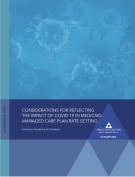HealthCheck, Fall/Winter 2021
 |
|
Fall/Winter 2021
VOL 12 | NO 4 |
HEWG Issues Request for Information
Comments Due Jan. 14
The Health Equity Work Group (HEWG) issued a request for information (RFI) to solicit input for its work assessing whether and how health actuarial practices and methods affect health disparities. Health actuaries often partner with other professionals in many different aspects of the health care, including those related to administration, financing, and care management.
The HEWG has identified four areas in which health actuaries are involved that may affect health disparities, either by contributing to or mitigating them, including: health insurance benefit design, provider contracting and network development, premium pricing, and managing population risk. The work group is also exploring data collection issues.
The HEWG is seeking articles, links, and other input, information, and existing or ongoing research in these areas from anyone with relevant information or perspectives, including, but not limited to health economists and health services researchers, actuaries, health plans and other payers, health care providers, health care consumers, policymakers, and other health policy experts or stakeholders.
The HEWG will use what it learns from this RFI to inform future papers on this topic, actuarial practices on health equity, and research proposal requests to further explore areas of interest. Respondents will be recognized as contributors to this work. In addition, the HEWG plans to hold a health equity symposium and respondents may be invited to attend and/or to present their work or perspectives.
Learn more about the RFI here. Comments are due by Jan. 14 and should be sent via email to healthequityRFI@actuary.org. Please include the phrase “HEWG Request for Information” in the subject line and do not password-protect any attachments. Comments may be sent via conventional mail to: Health Equity Work Group, American Academy of Actuaries, 1850 M Street NW Suite 300, Washington, DC 20036. Please contact Senior Health Policy Analyst Matthew Williams with any questions—williams@actuary.org.
Annual Meeting Looks at Health Issues Including COVID-19, Health Equity, Insurance, and Medicare

Boston University’s Andrew Stokes speaks at the COVID-19 plenary session
The Academy’s Annual Meeting and Public Policy Forum, held Nov. 4–5 in the nation’s capital as a hybrid event, covered multiple health topics, in both breakout and plenary sessions. It included plenary sessions that looked at COVID-19 and health equity, and breakout sessions with health-specific programming, including the outlook for regulating the Affordable Care Act (ACA) that featured representatives of the Centers for Medicare & Medicaid Services’ Center for Consumer Information and Insurance Oversight (CCIIO), addressing the risk of Medicare insolvency, and expanding access to health insurance coverage. A property/casualty session also looked at telehealth issues. For a complete recap of this outstanding event, be sure to check out the Annual Meeting and Public Policy supplement, published alongside the November Actuarial Update.
HEWG Releases Discussion Briefs on Population Health, Provider Contracting & Network Development
The HEWG released discussion briefs on population health and provider contracting and network development—both developed by the work group to provide more context on issues raised in the initial discussion brief, Health Equity from an Actuarial Perspective: Questions to Explore.
Health Equity from an Actuarial Perspective: Provider Contracting and Network Development addresses questions including:
- How do overall health plan spending or other outcome goals and considerations affect network development and provider contracting, and do these have effects on access to care and health disparities?
- How do alternative payment models (APMs) and cost targets for risk-bearing provider contracts affect provider incentives and disparities in health care access and outcomes?
- Are quality provisions and outcome measures in APM contracts aligned with achieving equitable health outcomes?
- How do the risk adjustment methods used in provider contracting and network development affect access to care and health outcomes?
Health Equity from an Actuarial Perspective: Managing Population Health, the final in the HEWG discussion-papers series, looks at questions such as:
- How do algorithms that are designed to identify enrollees for disease management, care management, or wellness programs—and the proxy data underlying the algorithms—affect disparities?
- When designing care management programs for specific populations, how are factors other than those directly related to health care considered, and how does applying the same rules and methods to different populations and markets affect health disparities?
- Does the focus on a one-year time horizon for program costs and benefits perpetuate disparities?
- Are financial metrics, such as return on investment, aligned with the goal of improved health outcomes in under-served or under-resourced groups, and do they widen or narrow health disparities?
The discussion paper series was undertaken by the HEWG to lay the groundwork for future exploration and research into health disparities. See more on the Academy’s Diversity, Equity & Inclusion webpage.
Academy Hosts Successful In-Person LHQ Seminar

Past President D. Joeff Williams leads an LHQ Seminar session
The Academy’s annual Life and Health Qualifications Seminar returned as an in-person event this year. Held Nov. 15–18 in Arlington, Va., the highly regarded and well-attended LHQ Seminar featured sessions on topics including professionalism, actuarial opinions, and cash flow, and interactive case-study breakout sessions that have long been highly valued by attendees—many return every few years to brush up on skills.
Attendees gained required basic education and continuing education to be qualified to sign NAIC Life and Health annual statements of actuarial opinion, and a range of topics were discussed, including principle-based reserving, risk adjustment data validation, and risk-based capital. David Dillon was a new member of the LHQ Seminar faculty, and Actuarial Standards Board Chairperson Darrell Knapp chaired the subcommittee that organized this year’s seminar.
Medicaid Committee Releases COVID-19 Issue Paper
 The Medicaid Committee released an issue paper, Considerations for Reflecting the Impact of COVID-19 in Medicaid Managed Care Plan Rate Setting, that explores key components of rate setting during or shortly after the COVID-19 pandemic, including data, assumptions and adjustments, risk mitigation, and communication.
The Medicaid Committee released an issue paper, Considerations for Reflecting the Impact of COVID-19 in Medicaid Managed Care Plan Rate Setting, that explores key components of rate setting during or shortly after the COVID-19 pandemic, including data, assumptions and adjustments, risk mitigation, and communication.

JamesHEWG Chairperson Annette James participated in a panel, “The Cost of Health Inequity: Dollars and Sense,” as part of The Alliance for Health Policy’s Health Equity Summit, held Sept. 15–16. Panelists discussed health disparities and health care financing from various standpoints, including the cost implications of inaction to address health inequities in terms of additional national health expenditures and lost productivity, and in context of the COVID-19 pandemic. James became a regular director on the Academy’s Board of Directors and was awarded an Outstanding Volunteerism Award at the Academy’s Annual Meeting and Public Policy Forum in November for her work leading the efforts of the HEWG.
LTC Reform Subcommittee Comments to NAIC
The Long-Term Care Reform Subcommittee sent a comment letter to the NAIC’s Long-Term Care Insurance (EX) Task Force regarding the exposure drafts of the operational and actuarial sections of the Long-Term Care Insurance Multi-State Rate Review Framework released in mid-September.
Risk Sharing Subcommittee Comments to CCIIO
The Risk Sharing Subcommittee sent a comment letter to CCIIO on the HHS-Operated Risk Adjustment Technical Paper on Possible Model Changes, which was exposed for comment in late October.
Health Practice Council Presents to HATF
Health Practice Council (HPC) volunteers presented to the NAIC’s Health Actuarial (B) Task Force (HATF) in early December.
- HPC Vice Chairperson Barb Klever provided an update on the HPC’s 2021 activities, including the COVID-19 pandemic’s implications for health care utilization and spending, health insurance coverage and the ACA, health equity, long-term care, and Medicare sustainability.
- The Long-Term Care (LTC) Valuation Work Group presented results of the LTC Insurance Mortality and Lapse Study. The work group released a major report, Long-Term Care Insurance Mortality and Lapse Study, resulting from a 2016 request from the NAIC’s Health Actuarial (B) Task Force regarding replacing the mortality and lapse bases for statutory minimum reserves. The study was completed jointly by the Academy and the Society of Actuaries Research Institute.
The Utah Insurance Department is seeking a Health Insurance Actuary to direct and enforce actuarial functions related to health insurance. The person in the position will apply advanced actuarial science, mathematical, and statistical methods for the review and approval of reports, financial statements, and rate filings, among other tasks. For more information and to apply, click here.
The Academy has long supported government employers that are seeking to hire qualified actuaries. For more information, see our Public Employment Opportunity Posting Policy.
|
Copyright © 2021 American Academy of Actuaries. All Rights Reserved. |

 Phone: 202-223-8196
Phone: 202-223-8196